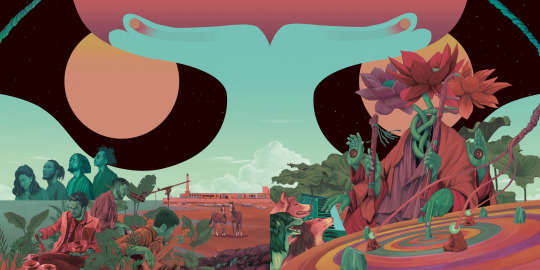#west african music
Explore tagged Tumblr posts
Text
youtube
Idrissa Kora, live in Barcelona for Petites Planètes
#music#african music#west african music#idrissa kora kouyaté#kora#idrissa kouyaté#el antisol negro#vicente barbarroja#video#vincent moon#barcelona#daniel oxenhandler#petites planètes#petites planetes#Youtube
50 notes
·
View notes
Text
youtube

Fantasy by Niniola featuring Femi Kuti - Directed by Sesan
#music#nigerian music#west african music#niniola#niniola apata#afrohouse#kel p#udoma peter kelvin amba#sax#saxophone#drumroll records#femi kuti#music video#video#sesan#Youtube
41 notes
·
View notes
Text
Rest in Peace to the wonderful Malian legend Toumani Diabaté, the king of kora 🇲🇱👑🖤
You will be so missed.


#toumani diabaté#Mali#malian#Malian musician#kora#musician#legend#🇲🇱#rip#music#west african music#African folk music#blacktumblr#black tumblr
36 notes
·
View notes
Text
Kalan Nege - Issa Bagayogo
#issa bagayogo#kalan nege#music#world music#west african music#malian music#an enduring delight#Bandcamp#malian
23 notes
·
View notes
Text


A little S.E. is all I need to get me through the week. Mississippi Records really went all out on these compilations-- I give them my highest recommendation!
Just lookit that beautiful reproduction label!
#S.E. Rogie#SE Rogie#Mississippi Records#Palm Wine#Palm Wine Music#sierra leone#african music#west african music#nedison collection#vinyl
7 notes
·
View notes
Video
youtube
I LOVE the music of Amadou & Mariam! This music video shows the amazing imagination of kids living our their dreams and imagining the boundless possibilities of the future. The lyrics are in French (Mali was once a French colony) and warn about the dangers of lies and division among community, a relevant message for our troubled times. Something I like about West African music is that it’s insanely catchy and ear-appealing but features lyrics with serious messages and social criticisms with rousing calls to action, instead of vapid sexual innuendo and drug references like a lot of western music these days.
#amadou and mariam#west african music#west africa#music#african music#Mali#afrofuturistic#positive messages#children playing#imagination#africans#african culture#creativity#world music#musicians
8 notes
·
View notes
Text
Currently working on Leona's one shot and taking this opportunity to listen to some Ali Farka Touré. I feel like desert blues is a good genre for Leona <3
youtube
5 notes
·
View notes
Text
United Freedom Collective - Am Ta and Space Intention (2022 & 2023)
Two amazing EP's showcasing various genres from around the world

UK based global folkloric entity United Freedom Collective have created a stunning and powerful collection of tracks over the span of two EPs. The collective uniquely blend diverse folk influences from around the world, electronic elements, classical and jazz instrumentation, plus dub, soul, indie, hip hop and funk elements into a cohesive free flowing output; and the spiritual and philosophical inspiration behind the music give it additional depth and power. This is music to be experienced.
#united freedom collective#world music#folk music#psychedelic music#west african music#chinese music#psychfolk#soul music#electronic music#cave dweller music#hip hop#dub music#funk music#Bandcamp
3 notes
·
View notes
Text

Various Artists - Music From Saharan WhatsApp
(2022 compilation)
Youtube Playlist | Bandcamp | Spotify
[West African Music, Tishoumaren, Minimal Synth, Tuareg Music, Mande Music]
#music#west african music#tishoumaren#minimal synth#tuareg music#mande music#compilation#youtube#playlist#bandcamp#spotify
1 note
·
View note
Video
youtube
Afrika by Dobet Gnahoré
#music#african music#dobet gnahore#dobet gnahoré#music of ivory coast#ivorian music#west african music#music of west africa#video#music video
27 notes
·
View notes
Text
youtube

INNOCENT (FAGBO) by Niniola from the album Colours and Sounds - Video directed by Adasa Cookey
#music#nigerian music#west african music#niniola#niniola apata#afrohouse#kel p#udoma peter kelvin amba#drumroll records#video#music video#adasa cookey#adasa rawlinson cookeygam#Youtube#SoundCloud
29 notes
·
View notes
Text
💃🏾✨🌹🖤

#Afro Cuban fusion#Guinean#percussionist#amara touré#west african music#le star band de Dakar#Senegal#afro music#music#tropicales#blacktumblr#spotfiy#Spotify#blackgirlmagic#caribbean#black tumblr#soundscapes of Africa
1 note
·
View note
Text
Beautiful African smile and 🤭 ass are dancing in Nigeria
#african beauty#african women#dark skin beauty#afro sexy#african smile#nigerian#african style#curls#west africa#african girl#african art#african music#african culture#african dance
303 notes
·
View notes
Text
Being Black is a privilege
#black people#black culture#dance#west coast#crip walk#music#black is beautiful#good music#black american culture#dancing#african american
266 notes
·
View notes
Text
youtube
More wonderful West African music!
2 notes
·
View notes
Text
Asake - Work Of Art (2023)
The second album from one of Nigeria's rising stars

In our latest @afrobeatsindacity republication, Ezema Patrick looks at Work Of Art, the new album from Nigerian afrobeat, pop, hip hop artist Asake, released June 16th on EMPIRE.
Asake pushes even further from the conventional in a bid to conquer sonic territory. He plants his base in the music that has brought him thus far - the rhythmic familiarity of log drums and shakers, the ethereal resonance of crowd backup vocals and his own euphonic delivery. Supreme ability and unshaking confidence in it are always a devastating match, and his blend of indigenous cultures and trendsetting house music of the future makes him a safe bet for the next great Nigerian star.
#afrobeat#hip hop#pop#afrofusion#nigerian music#african hip hop#nigerian hip hop#cave dweller music#asake#african music#west african music#Spotify
1 note
·
View note